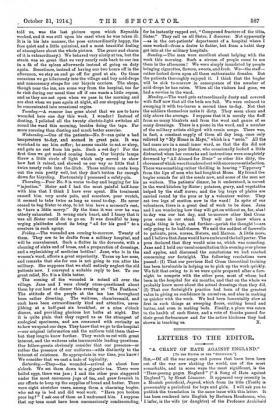LETTERS TO THE EDITOR.
"A CHANT OF HATE AGAINST ENGLAND."
[TO THE EDITOR OF THE " SPECTATOR."]
SIR,-Of all the war songs and poems that have been born out of the war now shaking the world, one of the most remarkable, and in some ways the most significant, is the "Hass-gesang gegen England" ("A Song of Hate against England"), by Ernst Lissaner. It appeared very recently in a Munich periodical, Jugend, which from its title (Youth) is presumably a periodical for boys and girls. I will ask you to publish the translation in the same issue with this letter. It has been rendered into English by Barbara Henderson, who, I infer, is the wife (or daughter) of the Professor Archibald
Henderson, of the University of North Carolina, who recently sent it to the New York Times.
It is difficult for Americans, and even for Canadians, who are gladly giving their young men and their money to help fight the British Empire's battle for democracy against the perverted philosophy of force, the doctrine that might makes right which Prussian militarism represents, and it is possibly almost as difficult for those in Great Britain itself, who are so close to the actual scenes of conflict, to realize the intense feeling of hatred which is at once the cause and the effect of this war. If those of us who are happily distant from the battle could imagine a state of feeling in any part of the British Empire which would lead the responsible editor of a magazine intended for youth to print such a "Song of Hate" in its columns, the shock that would come to us from the idea of feeding the minds of tender years with a song of that character would give a new and startling measure of volcanic hatreds leading up to and growing out of this war. And this may be said without criticizing the Munich editor for printing such a song. Doubtless he knew that it was representative of public feeling in Germany. It is that very fact which makes the song so significant.
Professor Henderson's own words are well worth repeat- ing :—
"It is a veritable war-chant of hate, resonant with the note of ancient tribal rites, and the primitive ferocity of a people stirred to the topmost pithh of a passionate racial animosity. It is a symbol of the spirit which has welded together into a marvellous union the entire German people of seventy millions, and made of them a fighting unit of almost incredible force and cohesiveness. The conquest of such a people—of a people solidly arrayed in a compact of hate against their greatest rival and stumbling-block, England—is a task which will tax to the uttermost the last resources of the Allies."
If your readers are as ignorant of the details of German geography as I was when the word " Weichsel " sent me to my atlas, they will be glad to be informed that it is the German name for the Vistula River, which is the strongest frontier defence against the Russians. And of course every one knows that passes through the Vosges Mountains opposite Alsace are one of the chief defences against the French.—
Washington, D.C.
"A CHANT OF HATE AGAINST ENGLAND. By ERNST Lissa:Erma in Jugend.
Rendered into English Verse by BARBARA. Hxynnasox.
French and Russian, they matter not;— A blow for a blow and a shot for a shot; We love them not, we bate them not ; We hold the Weichsel and Vosges-gate; We have but one and only hate ; We love as one, we hate as one, We have one foe, and one alone.
He is known to you all, he is known to you He crouches behind the dark grey flood, Full of envy, of rage, of craft, of gall, Cut off by waves that are thicker than blood.
Come, let us stand at the Judgment place, An oath to swear to, face to face, An oath of bronze, no wind can shake, An oath for our sons and their sons to take. Come, hear the word, repeat the word, Throughout the Fatherland make it heard :- 'We We will never forgo our hate; We all have a single hate ; We love as one, we hate as ono, We have one foe, and one alone—
ENGLAND !'
In the Captain's Mess, in the banquet-ball, Sat feasting the officers, one and all, Like a sabre-blow, like the swing of a sail, One seized his glass, held high to hail;
Sharp-snapped like the stroke of a rudder's play,
Spoke three words only To the DAY.'
Whose glass this fate?
They had all but a single hate.
Who was thus known ?
They had but one foe, and one alone—
ENGLAND
Take you the folk of the Earth in pay; With bars of gold your ramparts lay ; Bedeck the ocean with bow on bow ;- Ye reckon well, but not well enough, now. French and Russian, they matter not ;- A blow for a blow, a shot for a shot ; We fight the battle with bronze and steel, And the time that is coming Peace will seal.
You will we hate with a lasting hate ; We will never forgo our hate— Hate by water and hate by land, Hate of the head and hate of the hand, Hate of the hammer and hate of the crown, Hate of seventy millions, choking down;
We love as one, we hate as one, We have one foe, and one alone— ENGLAND 1"
[Jugend, the magazine in which this poem appeared, is probably the best-known periodical devoted to art and letters published in Germany, but, to judge from the habitual nature of its contents, the title indicates emancipation from tradition rather than any reverence for the young.--En. Spectator.]



































 Previous page
Previous page